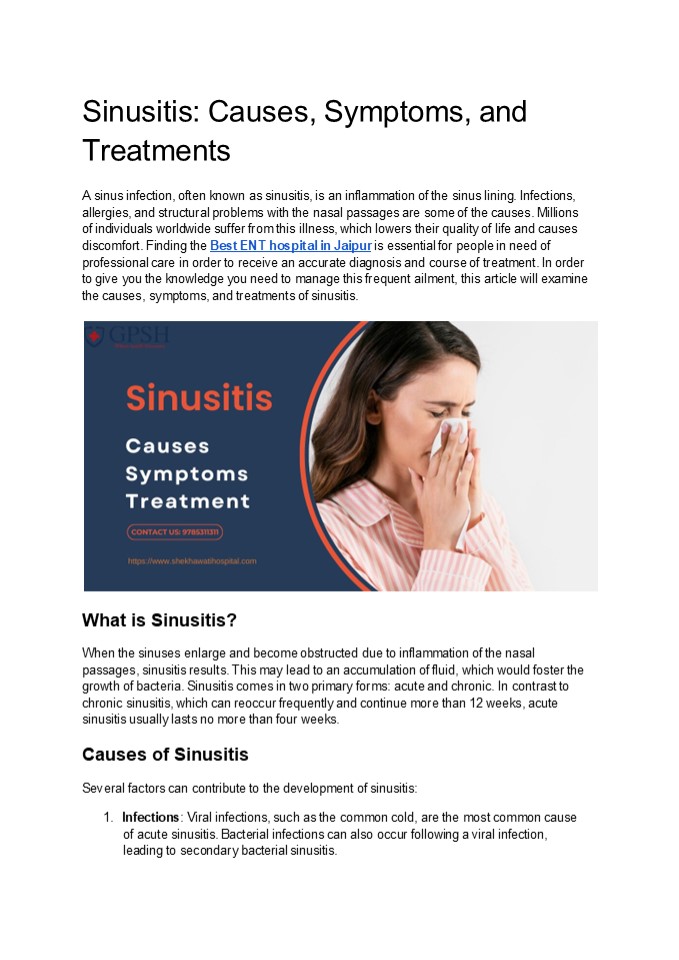Sinusitis: Causes, Symptoms, and Treatments
Title:
Sinusitis: Causes, Symptoms, and Treatments
Description:
A sinus infection, often known as sinusitis, is an inflammation of the sinus lining. Infections, allergies, and structural problems with the nasal passages are some of the causes. Millions of individuals worldwide suffer from this illness, which lowers their quality of life and causes discomfort. –
Number of Views:8
Title: Sinusitis: Causes, Symptoms, and Treatments
1
Sinusitis Causes, Symptoms, and Treatments
A sinus infection, often known as sinusitis, is
an inflammation of the sinus lining. Infections,
allergies, and structural problems with the nasal
passages are some of the causes. Millions of
individuals worldwide suffer from this illness,
which lowers their quality of life and causes
discomfort. Finding the Best ENT hospital in
Jaipur is essential for people in need of
professional care in order to receive an accurate
diagnosis and course of treatment. In order to
give you the knowledge you need to manage this
frequent ailment, this article will examine the
causes, symptoms, and treatments of sinusitis.
What is Sinusitis? When the sinuses enlarge and
become obstructed due to inflammation of the
nasal passages, sinusitis results. This may lead
to an accumulation of fluid, which would foster
the growth of bacteria. Sinusitis comes in two
primary forms acute and chronic. In contrast to
chronic sinusitis, which can reoccur frequently
and continue more than 12 weeks, acute sinusitis
usually lasts no more than four weeks. Causes of
Sinusitis Several factors can contribute to the
development of sinusitis 1. Infections Viral
infections, such as the common cold, are the most
common cause of acute sinusitis. Bacterial
infections can also occur following a viral
infection, leading to secondary bacterial
sinusitis.
2
- Allergies Allergic reactions to environmental
factors, such as pollen, dust, or pet dander,
can trigger sinusitis by causing inflammation and
swelling in the nasal passages. - Nasal Polyps These noncancerous growths in the
nasal passages can obstruct the sinuses, leading
to sinusitis. - Deviated Septum A misalignment of the nasal
septum can restrict airflow and drainage, making
sinus infections more likely. - Environmental Factors Exposure to irritants such
as smoke, pollution, and strong odors can
contribute to sinus inflammation. - Weakened Immune System Individuals with
compromised immune systems may be more
susceptible to sinus infections due to their
body's reduced ability to fight off pathogens. - Symptoms of Sinusitis
- The symptoms of sinusitis can vary in severity
and may include - Nasal Congestion Difficulty breathing through
the nose due to swelling and blockage. - Facial Pain or Pressure Discomfort around the
eyes, forehead, and cheeks, especially when
bending forward. - Headache Persistent headaches that may worsen
with sinus pressure. - Thick Nasal Discharge Discolored (yellow or
green) mucus discharge from the nose. - Reduced Sense of Smell A temporary decrease in
the ability to smell. - Cough A cough that may worsen at night due to
postnasal drip. - Fatigue A general feeling of tiredness or
malaise. - Fever A low-grade fever may accompany acute
sinusitis. - Diagnosis of Sinusitis
- To diagnose sinusitis, an ENT specialist will
conduct a thorough examination, which may
include
3
- Home Remedies Many individuals find relief
through simple home remedies such as - Steam Inhalation Inhaling steam from hot water
can help moisten the nasal passages and ease
congestion. - Saline Nasal Spray Using a saline solution can
help rinse out the nasal passages and reduce
inflammation. - Warm Compresses Applying warm compresses to the
face can alleviate sinus pressure and discomfort. - Medications
- Decongestants Over-the-counter decongestants can
help reduce nasal swelling and congestion. - Antihistamines These medications can alleviate
allergy-related sinusitis symptoms. - Pain Relievers Over-the-counter pain relievers
like ibuprofen or acetaminophen can help manage
discomfort and headaches. - Antibiotics If a bacterial infection is
suspected, antibiotics may be prescribed for
acute sinusitis. However, they are ineffective
against viral infections. - Nasal Corticosteroids Prescription nasal sprays
can reduce inflammation and treat chronic
sinusitis effectively. - Surgery In cases of chronic sinusitis that do
not respond to medical treatments, surgery may
be necessary. This may involve removing nasal
polyps or correcting structural issues like a
deviated septum to improve sinus drainage. - Prevention of Sinusitis
- Preventing sinusitis involves addressing the
underlying causes and minimizing risk factors.
Some effective strategies include - Allergy Management Identifying and avoiding
allergens can help reduce inflammation in the
nasal passages. - Avoiding Irritants Steering clear of smoke,
strong odors, and pollution can protect the
sinuses. - Maintaining Good Hygiene Regular handwashing can
help reduce the risk of viral infections. - Staying Hydrated Drinking plenty of fluids can
help keep mucus thin and promote sinus drainage. - Using a Humidifier Keeping the indoor air moist
can prevent dryness and irritation in the nasal
passages.
4
(No Transcript)































